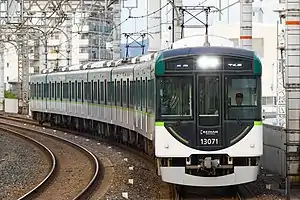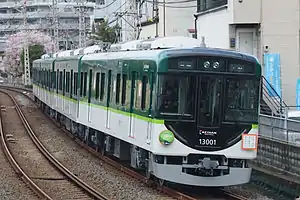Keihan 13000 series
The Keihan 13000 series (京阪13000系, Keihan 13000-kei) is an electric multiple unit (EMU) commuter train type operated by the private railway operator Keihan Electric Railway on the Keihan Uji Line and other lines in Kyoto, Japan, since April 2012. The initial order consisted of five 4-car sets, intended to replace 20 life-expired 2600 series vehicles,[1][2] and as of 1 April 2017, the fleet consists of seven four-car sets and five seven-car sets.
| Keihan 13000 series | |
|---|---|
 7-car set 13021 in September 2018 | |
| In service | 2012–present |
| Manufacturer | Kawasaki Heavy Industries |
| Built at | Kobe |
| Family name | City commuter |
| Replaced | Keihan 2600 series |
| Constructed | 2012– |
| Entered service | 14 April 2012 |
| Number built | 63 vehicles (12 sets; as of April 2017) |
| Number in service | 65 vehicles (12 sets) (2 vehicles transferred from 3000 series) |
| Formation | 4/7 cars per trainset |
| Fleet numbers |
|
| Capacity | 530 (4-car sets) |
| Operator(s) | Keihan Electric Railway |
| Line(s) served | |
| Specifications | |
| Car body construction | Aluminium alloy |
| Car length | 18.9 m (62 ft 0 in) (end cars) 18.7 m (61 ft 4 in) (intermediate cars) |
| Width | 2,792 mm (9 ft 1.9 in) |
| Doors | 3 pairs per side |
| Maximum speed | 110 km/h (68.4 mph) |
| Traction system | Variable-frequency(IGBT/SiC) |
| Acceleration | 2.8 km/(h⋅s) (1.7 mph/s) |
| Deceleration | 4 km/(h⋅s) (2.5 mph/s) (service) 4.3 km/(h⋅s) (2.7 mph/s) (emergency) |
| Electric system(s) | 1,500 V DC |
| Current collector(s) | Overhead wire |
| Bogies | KW-77D (motored), FS577 (trailer) |
| Safety system(s) | Keihan ATS |
| Track gauge | 1,435 mm (4 ft 8+1⁄2 in) |
Design
The overall design concept draws on the design of the 3000 series EMU trains introduced from 2008.[1]
The new trains include energy-saving and environmentally friendly features. The 13000 series trains will use 35% less power than the 2600 series they are intended to replace, and produce less environmental noise in service.[1] The cars feature aluminium alloy bodies with a semi-double skin construction, and incorporate increased crash resistance.[1]
The end cars are each equipped with one PT-4805-A scissors-type pantograph recycled from withdrawn rolling stock.[3]
Interior
Internally, LCD passenger information screens are provided above doorways.[1]
Longitudinal bench seating use contoured "bucket seats" with a width of 470 mm (19 in) per passenger.[1]
Luggage racks are lowered by 2 cm (0.79 in) to a height of 175 cm (69 in) for accessibility, with the racks above priority seating lowered 5 cm (2.0 in) to a height of 172 cm (68 in).[1]
The interior flooring design is intended to evoke an image of Kyoto's traditional stone-paved streets.[4]
The 2nd-batch sets, 13006 onward, use LED lighting.[5]
 Interior of a 13020 series set, June 2014
Interior of a 13020 series set, June 2014 7-person bench seat
7-person bench seat Sliding doors and LCD passenger information screen
Sliding doors and LCD passenger information screen
Formations
As of 1 April 2017,[6] the fleet consists of seven four-car sets (13001 to 13007) and five seven-car sets (13021 to 13025), formed as follows, with the Mc1/Mc3 cars at the Kyoto/Uji end.[3][7]
Odd-numbered sets
| Designation | Mc1 | T0 | T1 | Mc4 |
|---|---|---|---|---|
| Numbering | 13000 | 13500 | 13650 | 13050 |
| Weight (t) | 36.0 | 28.5 | 26.0 | 36.5 |
| Capacity (total/seated) |
128/43 | 137/49 | 128/43 | |
Even-numbered sets
| Designation | Mc3 | T0 | T1 | Mc2 |
|---|---|---|---|---|
| Numbering | 13000 | 13500 | 13650 | 13050 |
| Weight (t) | 36.5 | 28.5 | 26.0 | 36.0 |
| Capacity (total/seated) |
128/43 | 137/49 | 128/43 | |
- "Mc" cars are motored driving cars (with driving cabs).
- "T" cars are unpowered trailer cars.
- The Mc cars each have one PT-4805-A scissors-type pantograph.[3]
- The Kyoto/Uji end Mc3 cars of even-numbered sets are fitted with gangway connections, enabling coupling to the Nakanoshima end Mc4 cars of odd-numbered sets.[3][8]
 4-car set 13001 in April 2012
4-car set 13001 in April 2012
7-car sets
| Designation | Mc1 | T0 | T2 | M1 | T3 | T4 | Mc2 |
|---|---|---|---|---|---|---|---|
| Numbering | 13020 | 13520 | 13720 | 13170 | 13570 | 13770 | 13070 |
The three motored cars (Mc1, M1, and Mc2 cars) each have one scissors-type pantograph.[7] The "T0" car is designated as a "mildly air conditioned" car.[7]
On sets with former 3000 series, the T4 position uses a different numbering, 13870, which corresponds to the former typing.[9]
 7-car set 13024
7-car set 13024
History
The first set, 13001, was delivered from the Kawasaki Heavy Industries factory in Kobe to Keihan's Neyagawa Depot in March 2012.[10] It entered service on 14 April 2012.[3] The second set, 13002, entered revenue service on 30 May 2012.[8]
From 9 June 2012, 13000 series sets were also introduced on the Keihan Katano Line.[11]
The first second-batch set, 13006, entered service on 7 April 2014, followed by two 7-car sets, 13021 and 13022, which entered service in May 2014.[5][7]
The fleet began operation on the Keihan Main Line on 30 May 2014.[12]
The third batch of sets was delivered between 2016 and 2017.[6][13]
Beginning in June 2023, spare 3000 series cars made redundant through the introduction of “Premium cars” were reclassified as 13000 series cars and inserted into existing 13000 sets, replacing an original 13000 series car in the process.[9] As of June 2023, the spare cars retain their longitudinal seating layout. The first set to receive a replacement car was set 13021, followed by 13023 the following month.[14]
Fleet history
The build history for the fleet is as shown below.[7] All sets were manufactured by Kawasaki Heavy Industries.
| Set No. | Date delivered | Remarks |
|---|---|---|
| 13001 | 26 March 2012 | First batch |
| 13002 | 25 May 2012 | |
| 13003 | 8 June 2012 | |
| 13004 | 26 June 2012 | |
| 13005 | 10 July 2012 | |
| 13006 | 19 March 2014 | Second batch |
| 13021 | 23 April 2014 | |
| 13022 | 24 July 2014 | |
| 13007 | 2016 | Third batch[6] |
| 13023 | ||
| 13024 | ||
| 13025 | 2017[13] |
References
- 新型車両13000系20両を新造します。 [20 New 13000 Series Cars to be Built] (PDF). News Release (in Japanese). Japan: Keihan Electric Railway. 12 December 2011. Retrieved 12 December 2011.
- 宇治・伏見観光キャンペーン [Uji & Fushimi Tourist Promotion] (PDF). News Release (in Japanese). Japan: Keihan Electric Railway. 23 March 2012. Retrieved 27 March 2012.
- 京阪電気鉄道13000系 [Keihan Electric Railway 13000 series]. Japan Railfan Magazine (in Japanese). Vol. 52, no. 614. Japan: Kōyūsha Co., Ltd. June 2012. pp. 78–82.
- Kameda, Sanae (12 December 2011). 京阪電鉄:来春から「13000系」20両順次導入 [Keihan Electric Railway to introduce 20 13000 series cars from next spring]. Mainichi jp (in Japanese). Japan: The Mainichi Newspapers. Archived from the original on 19 February 2013. Retrieved 13 December 2011.
- 京阪電気鉄道13000系に2次車が登場 [Keihan 13000 series 2nd-batch set appears]. Japan Railfan Magazine (in Japanese). Vol. 54, no. 639. Japan: Koyusha Co., Ltd. July 2014. p. 99.
- 私鉄車両編成表 [Private Railway Rolling Stock Formations - January 2017 issue] (in Japanese). Japan: Kotsu Shimbunsha. 2016. p. 126.
- 私鉄車両編成表 私鉄車両編成表 2015 [Private Railway Rolling Stock Formations - 2015] (in Japanese). Japan: Kotsu Shimbunsha. 23 July 2015. p. 135. ISBN 978-4-330-58415-7.
- 京阪13000系第2編成が営業運転を開始 [Second Keihan 13000 series set enters service]. Japan Railfan Magazine Online (in Japanese). Japan: Koyusha Co., Ltd. 1 June 2012. Retrieved 1 June 2012.
- "京阪13000系13021編成に13871号車が組み込まれる" [Insertion of car 13871 to Keihan 13000 series set 13021]. Japan Railfan Magazine Online (in Japanese). Archived from the original on 1 July 2023. Retrieved 1 July 2023.
- 京阪13000系第1編成の搬入が終了 [First Keihan 13000 series set delivered]. Japan Railfan Magazine Online (in Japanese). Japan: Koyusha Co., Ltd. 14 March 2012. Retrieved 16 March 2012.
- 京阪13000系,交野線で営業運転開始 [Keihan 13000 series enter service on Katano Line]. Japan Railfan Magazine Online (in Japanese). Japan: Koyusha Co., Ltd. 10 June 2012. Retrieved 10 June 2012.
- "京阪13000系が本線での営業運転を開始" [Keihan 13000 series begins commercial operation on the Main Line]. Japan Railfan Magazine Online (in Japanese). 31 May 2014. Retrieved 26 December 2021.
- "京阪13000系13025編成が試運転" [Keihan 13000 series set 13025 commissioned]. Japan Railfan Magazine Online (in Japanese). 29 March 2017. Retrieved 26 December 2021.
- "京阪13000系13023編成に13873号車が組み込まれる" [Keihan 13000 series set 13023 receives replacement car 13873]. Japan Railfan Magazine Online (in Japanese). 10 July 2023. Retrieved 10 July 2023.
External links
- Official website (in Japanese)
